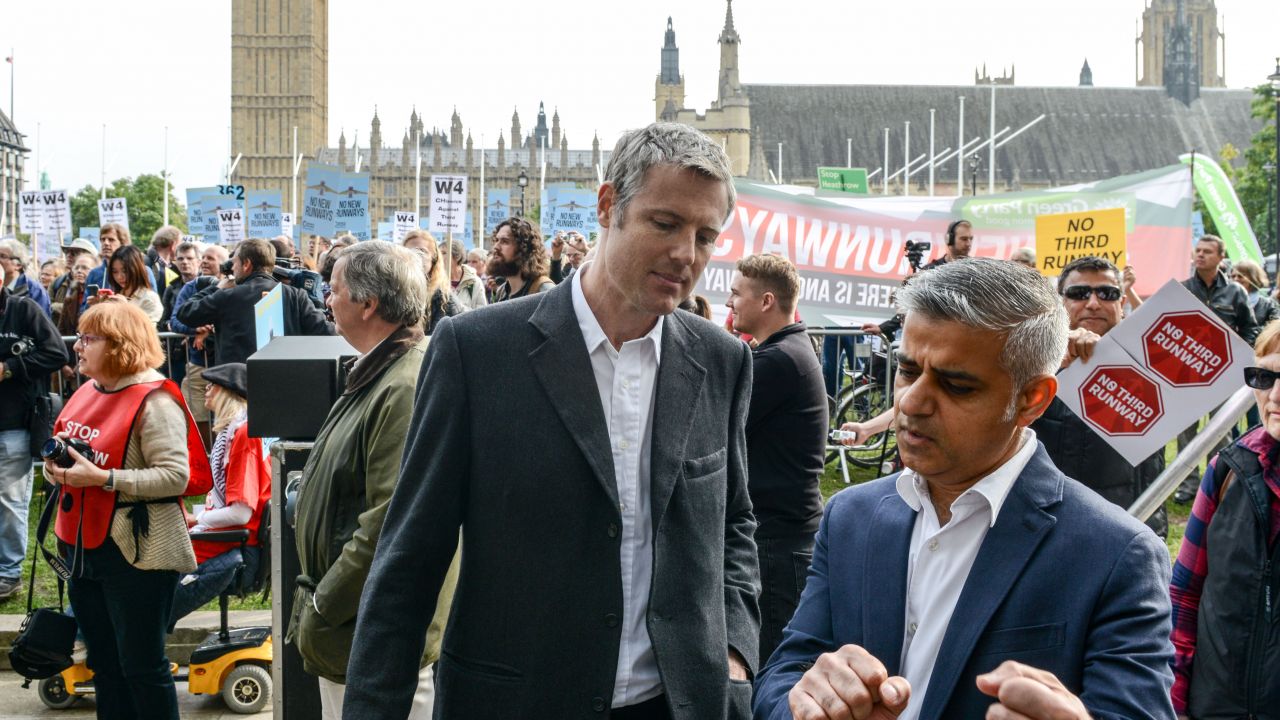
The mayoral race between Conservative Zac Goldsmith (L) and Labour candidate Sadiq Khan turned into a referendum on Londoners' tolerance. (Photo by Chris Ratcliffe/Getty Images)
This year’s London mayoral election, only the fifth time citizens of Great Britain’s capital have directly elected a mayor for the whole of the metropolis, initially promised to be the boring one. Previous polls had been dominated by two big beasts: Ken Livingstone, the ultimate left-wing machine politician and scourge of Margaret Thatcher when he led the Greater London Council in the 1980s, and Conservative Boris Johnson, the charismatic, floppy-haired, classics-quoting, New York-born buffoon whose reign as leader of the city has largely been characterized by vanity projects (a pointless new design for the city’s famous red buses, a bizarre “garden bridge” that no one apart from the mayor seems to want or understand, a cable car over the river that goes from nowhere to nowhere else).
The main candidates this time were tame in comparison: Zac Goldsmith, like Johnson, an extremely wealthy former pupil of Eton, the elite private school (also the alma mater of prime minister David Cameron) and Sadiq Khan, the son of a Pakistani immigrant bus driver who had grown up on a government housing scheme. While the divisions between the two were obvious, it was not immediately obvious that the campaign would flare up the way it did. Goldsmith was generally considered nice-but-dim, while Khan seemed a competent but uninspiring Labour apparatchik.
The issues at stake, too, were fundamentally the same that animate any major city’s politics: housing and transport.
But most Londoners who voted Thursday could not give you a detailed description of the differences between Goldsmith and Khan’s plans for affordable accommodation or the price of an Underground journey. That’s thanks to a disastrous miscalculation by the Conservative campaign that turned the contest into one about race, religion, multiculturalism and, most importantly, how Londoners feel about their city.
The Conservative mayoral campaign was managed by a man called Mark Fullbrook of the campaigns firm Crosby Textor. Co-founder Lynton Crosby, an Australian, had delivered an unexpectedly decisive victory for the party in the 2015 general election. Crosby is not liked very much. Indeed, it would be a stretch to say that Crosby is respected. But he is acknowledged as someone who wins elections with an abrasive, aggressive style that is generally seen as part and parcel of campaigns in his native country , but not quite cricket in the UK.
Crosby and his associates are seen as masters of the dark arts, of the “dog-whistle” style on the murkier aspects of political debate (immigration, social welfare) and most famously, the dead cat strategy, where one distracts from a government’s poor performance on an issue by standing up a junior member of the party to say something controversial, idiotic but headline grabbing (throwing a “dead cat” on the table).
The Conservative campaign, then, went straight for the supposed dark recesses of Londoners’ souls. Khan, the Conservatives claimed, was an associate of “extremists,” a “radical” who, rather than be considered for leader of the city, should instead be seen as a threat. The intent behind labeling a practicing Muslim “extremist” and “radical” is obvious.
The Goldsmith campaign didn’t stop there. In an attempt to exploit sectarian divisions between London’s Asian communities, fliers were sent to families with Hindu- and Sikh-sounding names. Khan, of Pakistani origin, was no friend of India, they were told. He had not attended a rally to greet the Indian Prime Minister Narendra Modi when he visited London. His party supported a “wealth tax” on family jewelry. Goldsmith, on the other hand, was always sure to celebrate Hindu festivals. (This proclamation of his love for the culture of India came unstuck in the days before the election, when video emerged of Goldsmith declaring his love for Bollywood films, but being unable to name a single Indian film or film star when asked).
It all culminated in a disastrous op-ed piece in the Mail On Sunday newspaper, where Goldsmith threw more accusations at Khan. The article was illustrated with an iconic image of a red bus that had been blown up by a suicide bomber in the 7/7 attack on the city. This felt a smear too far for many Londoners.
Khan, meanwhile, was cannier. No one was ever allowed to forget that he had risen from humble origins. Not a day went by when he did not point out that his support for gay marriage had earned him threats from extremist Muslims. He embodied, in a way, the London version of the American dream – the city as a place where people of all backgrounds and persuasions can thrive. In a diverse city, more people probably had friends like the fairly normal-seeming Khan than Goldsmith, a bona-fide member of the international jet set. Goldsmith didn’t know what stadiums soccer teams played at, the sequence of stops on an underground line, or even how to drink a pint of beer properly.
In the end, even Goldsmith’s party turned against his campaign strategy. As polls closed, Andrew Boff, the leader of the Conservatives in the London Assembly, appeared on BBC’s Newsnight, essentially disowning the party’s campaign, and complaining that Goldsmith and his advisers had done “real damage” to the party in the capital, particularly in relation to its standing among minorities (the Conservative party has consistently struggled to reach out to minorities, and many in the party are exasperated that it still fails to reach the city’s many socially-conservative, small-business owning voters).
Londoners will bask in this weekend’s sunshine, reassured that after Khan’s victory, the city’s multicultural nature will be safeguarded. The great mix of people is what the metropolis is for, after all. London is constantly reassuring itself that it is the greatest city in the world (while anxiously watching New York). The Conservatives had hoped that the “donut strategy” Boris Johnson deployed (appealing to the white, affluent outer suburbs) would work again, but the city’s demographics have become too complex for that.
The election of a left-leaning Muslim mayor is something we’ll hold up as proof of our cosmopolitan brilliance for days to come. Meanwhile, the Conservatives will have to deal with the legacy of a campaign that was not just low, but incompetent.
Updated: This post originally said that George Osborne was educated at Eton. He was not. The post has been corrected and the reference to him removed.




